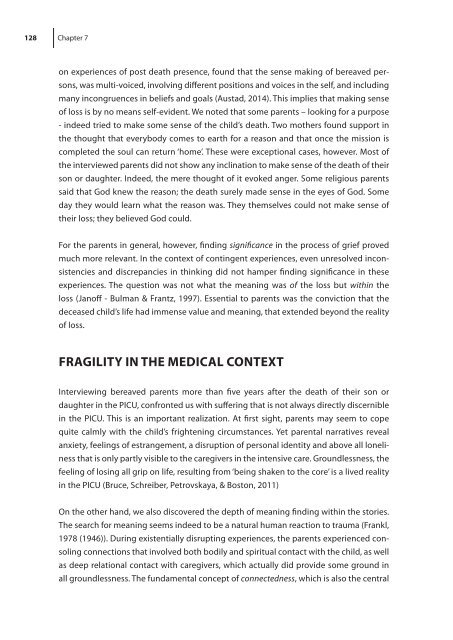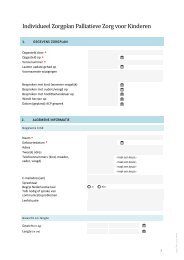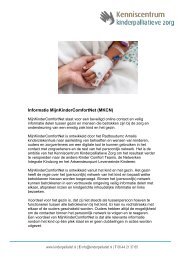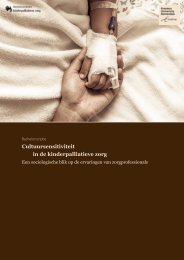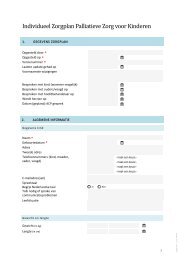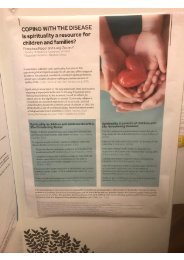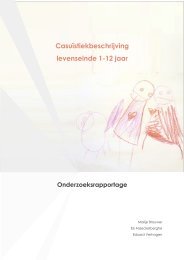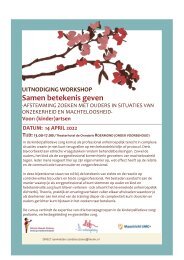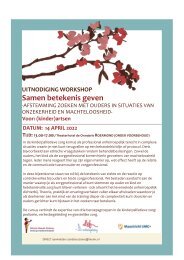Unveiling a fragile spirituality: Experiences of connectedness in pediatric palliative care
You also want an ePaper? Increase the reach of your titles
YUMPU automatically turns print PDFs into web optimized ePapers that Google loves.
128 Chapter 7<br />
on experiences <strong>of</strong> post death presence, found that the sense mak<strong>in</strong>g <strong>of</strong> bereaved persons,<br />
was multi-voiced, <strong>in</strong>volv<strong>in</strong>g different positions and voices <strong>in</strong> the self, and <strong>in</strong>clud<strong>in</strong>g<br />
many <strong>in</strong>congruences <strong>in</strong> beliefs and goals (Austad, 2014). This implies that mak<strong>in</strong>g sense<br />
<strong>of</strong> loss is by no means self-evident. We noted that some parents – look<strong>in</strong>g for a purpose<br />
- <strong>in</strong>deed tried to make some sense <strong>of</strong> the child’s death. Two mothers found support <strong>in</strong><br />
the thought that everybody comes to earth for a reason and that once the mission is<br />
completed the soul can return ‘home’. These were exceptional cases, however. Most <strong>of</strong><br />
the <strong>in</strong>terviewed parents did not show any <strong>in</strong>cl<strong>in</strong>ation to make sense <strong>of</strong> the death <strong>of</strong> their<br />
son or daughter. Indeed, the mere thought <strong>of</strong> it evoked anger. Some religious parents<br />
said that God knew the reason; the death surely made sense <strong>in</strong> the eyes <strong>of</strong> God. Some<br />
day they would learn what the reason was. They themselves could not make sense <strong>of</strong><br />
their loss; they believed God could.<br />
For the parents <strong>in</strong> general, however, f<strong>in</strong>d<strong>in</strong>g significance <strong>in</strong> the process <strong>of</strong> grief proved<br />
much more relevant. In the context <strong>of</strong> cont<strong>in</strong>gent experiences, even unresolved <strong>in</strong>consistencies<br />
and discrepancies <strong>in</strong> th<strong>in</strong>k<strong>in</strong>g did not hamper f<strong>in</strong>d<strong>in</strong>g significance <strong>in</strong> these<br />
experiences. The question was not what the mean<strong>in</strong>g was <strong>of</strong> the loss but with<strong>in</strong> the<br />
loss (Jan<strong>of</strong>f - Bulman & Frantz, 1997). Essential to parents was the conviction that the<br />
deceased child’s life had immense value and mean<strong>in</strong>g, that extended beyond the reality<br />
<strong>of</strong> loss.<br />
FRAGILITY IN THE MEDICAL CONTEXT<br />
Interview<strong>in</strong>g bereaved parents more than five years after the death <strong>of</strong> their son or<br />
daughter <strong>in</strong> the PICU, confronted us with suffer<strong>in</strong>g that is not always directly discernible<br />
<strong>in</strong> the PICU. This is an important realization. At first sight, parents may seem to cope<br />
quite calmly with the child’s frighten<strong>in</strong>g circumstances. Yet parental narratives reveal<br />
anxiety, feel<strong>in</strong>gs <strong>of</strong> estrangement, a disruption <strong>of</strong> personal identity and above all lonel<strong>in</strong>ess<br />
that is only partly visible to the <strong>care</strong>givers <strong>in</strong> the <strong>in</strong>tensive <strong>care</strong>. Groundlessness, the<br />
feel<strong>in</strong>g <strong>of</strong> los<strong>in</strong>g all grip on life, result<strong>in</strong>g from ‘be<strong>in</strong>g shaken to the core’ is a lived reality<br />
<strong>in</strong> the PICU (Bruce, Schreiber, Petrovskaya, & Boston, 2011)<br />
On the other hand, we also discovered the depth <strong>of</strong> mean<strong>in</strong>g f<strong>in</strong>d<strong>in</strong>g with<strong>in</strong> the stories.<br />
The search for mean<strong>in</strong>g seems <strong>in</strong>deed to be a natural human reaction to trauma (Frankl,<br />
1978 (1946)). Dur<strong>in</strong>g existentially disrupt<strong>in</strong>g experiences, the parents experienced consol<strong>in</strong>g<br />
connections that <strong>in</strong>volved both bodily and spiritual contact with the child, as well<br />
as deep relational contact with <strong>care</strong>givers, which actually did provide some ground <strong>in</strong><br />
all groundlessness. The fundamental concept <strong>of</strong> <strong>connectedness</strong>, which is also the central


